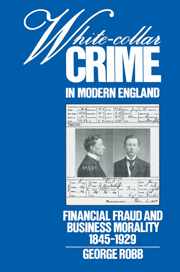Book contents
- Frontmatter
- Contents
- List of tables
- Acknowledgments
- Introduction: White-collar crime and the criminal “upperworld”
- 1 The new economy: transformation of finance and opportunities for crime
- 2 The Railway Mania
- 3 Banking and credit fraud
- 4 Stock fraud
- 5 Company fraud: promotion
- 6 Company fraud: management
- 7 Company law and the courts
- 8 Business ethics and professionalization
- Conclusion: Final considerations
- Notes
- Bibliography
- Index
Introduction: White-collar crime and the criminal “upperworld”
Published online by Cambridge University Press: 08 December 2009
- Frontmatter
- Contents
- List of tables
- Acknowledgments
- Introduction: White-collar crime and the criminal “upperworld”
- 1 The new economy: transformation of finance and opportunities for crime
- 2 The Railway Mania
- 3 Banking and credit fraud
- 4 Stock fraud
- 5 Company fraud: promotion
- 6 Company fraud: management
- 7 Company law and the courts
- 8 Business ethics and professionalization
- Conclusion: Final considerations
- Notes
- Bibliography
- Index
Summary
Fraud has been characterized as the growth industry of our times. After all, one can scarcely open a newspaper these days without reading about some new financial scandal on Wall Street or in the City of London. The recent collapse of the Bank of Credit and Commerce International, the break-up of the late Robert Maxwell's media empire and the continuing saga of the American Savings and Loan crisis have all given rise to numerous charges of fraud. This has been the era of Ivan Boesky, the Wall Street financier who in his heyday proclaimed “greed is good!” though was sentenced to three years' imprisonment for insider trading in 1987. Boesky's downfall was followed shortly by the indictment and trial in England of Guinness Chairman Ernest Saunders for the secret purchase of his company's own shares and in America of “junk bond” king Michael Milken for fraudulent trading. In September 1990 Saunders and three other Guinness board members were found guilty of numerous breaches of commercial law and received prison sentences ranging from twelve months to five years. In December Milken was sentenced to ten years for securities fraud.
In these days of money laundering through Swiss bank accounts and of dummy corporations registered in Panama or Liechtenstein, we are apt to imagine that white-collar crime is a recent phenomenon – the product of Reagan's America or Thatcher's Britain. The real origins of white-collar crime, however, lie almost two hundred years in the past, in the tremendous financial growth which accompanied the British Industrial Revolution.
The Industrial Revolution called into being a complex economy increasingly dependent on finance and investment.
- Type
- Chapter
- Information
- White-Collar Crime in Modern EnglandFinancial Fraud and Business Morality, 1845–1929, pp. 1 - 10Publisher: Cambridge University PressPrint publication year: 1992



